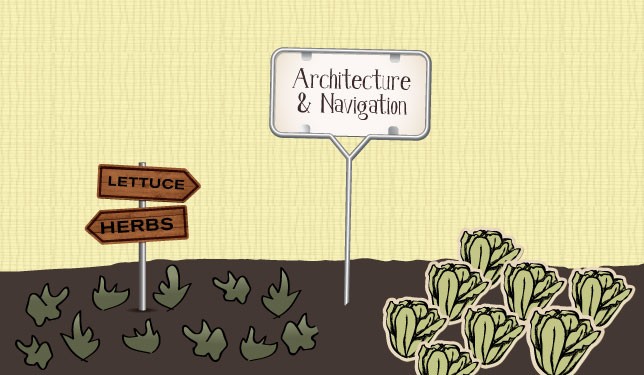Organization Is Important, Architecture & Navigation
Your garden and website should be well planned, organized and easy to get around. The goal is to make it easy for people to find what they are looking for.
In a garden, grouping related plants (i.e. herbs) in one area makes it easy for people to find what interests them. Providing maps and signage is also helpful. Using labels on plants helps people understand what they are looking at.
Similarly, your website should be organized and easy to navigate. One thing to consider is the structure and overall page layout of the site. Search engines—just like people—want it to be obvious what pages are on the site and how they are related to each other. Through internal linking in a navigation system, you show users and search engines the structure of your site. The navigation should be intuitive and make logical sense to users and search engines alike.
If you have a blog, it should be organized into topical categories with more specific subjects identified by “tags,” which help people to sort information and find related material. Try to use keywords in both the category names and the tags. For example, a category might be “native plants,” and a tag might be “prairie dropseed.”
One thing that will infuriate users and hurt your SEO is having broken links or missing pages. It would be like having a sign in your garden that says “Herb Garden This Way” that actually directs visitors to an empty field.
If a link is broken, a user will get the all-too-ubiquitous 404 error, a page saying the URL you tried to find does not exist. At the very least you should have a 404 page template so when a user gets a broken or missing link, a user can easily get to another page on your website by using the navigation menu. If a page has disappeared because the URL has changed, it’s a good idea to have your web developer add a 301 redirect to the new page.
Resource: We recommend installing a tool such as Broken Link Checker on your WordPress website https://wordpress.org/plugins/broken-link-checker. This will show you if you have broken links so you can remedy them.
It’s a great idea to have an onsite search box so someone can type in a word or phrase and quickly find out if your site has that content. This can also provide clues as to whether people are able to find what they are looking for using your navigation.
Advanced SEO Topics
In gardening, there are a few things for which a novice gardeners would likely need to seek professional help. For example, you would not try to use a tractor to re-grade a large area of soil or build a 6-foot retaining wall if you didn’t know what you were doing.
With SEO, there are also a few things that affect your Google ranking but are more complex than an average business owner or marketer would want to learn about.
There are many important elements in the code of a website that make up its architecture that will either facilitate or encumber the ability for search engines crawling your site. When building the website, your developer should be using SEO best practices to ensure your site is easy for search engines to index.
The topics below are important for SEO but beyond the scope of this book. I am listing them so you are aware they are factors, but I will not go into details or definitions.
- the use of “divs” instead of tables for layout
- dynamic sitemaps
- appropriate placement of scripts and other code
- meaningful URLs (otherwise known as “pretty permalinks”)
- duplicate content issues (often a result of on-site search pages or archive pages)
- and schema markup.
Resource: To read more about some of these complex SEO topics, we recommend this book: www.amazon.com/Inbound-Marketing-SEO-Insights-Blog/dp/1118551559
If your web developer plans to use a proprietary CMS (i.e. one they created that is not “open source”), ask him or her about SEO before committing to any contracts. You are safer sticking to one of the major CMS’s, such as WordPress, Joomla, Drupal and Expression Engine. These are already built with SEO best practices and updated regularly.
Sore Thumb SEO
You should never have content or pages that are visible to search engines but hidden from real people.



